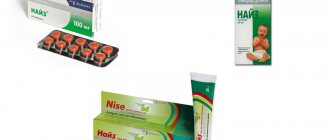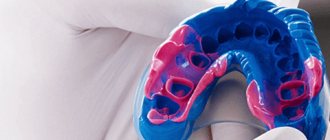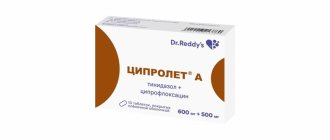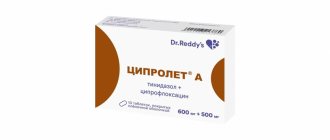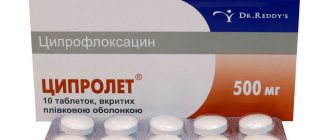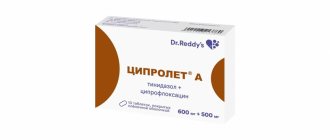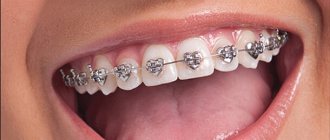Characteristics of Tsifran
Cifran is an antibiotic of the fluoroquinol group. It is used for infectious diseases that are accompanied by a strong inflammatory process. The effectiveness of treatment is based on the fact that the drug interferes with the activity of pathogenic microorganisms and does not allow them to multiply. The main component of Cifran is active against gram-positive and gram-negative bacteria that are insensitive to the action of cephalosporins, aminoglycosides and penicillin.
Cifran is an antibiotic that is used for infectious diseases accompanied by severe inflammation.
Indications for the use of the drug are as follows:
- diseases of bones and joints: osteomyelitis, septic arthritis, sepsis;
- eye infections: corneal ulcers, blepharitis, conjunctivitis, etc.;
- gynecological pathologies: endometritis, inflammatory processes in the pelvis;
- skin diseases: infected burn wounds, ulcers, abscesses;
- ENT diseases: inflammation of the middle ear, sinusitis, sinusitis, pharyngitis, tonsillitis;
- diseases of the urinary system: pyelitis, chlamydia, gonorrhea, prostatitis, pyelonephritis, kidney stones;
- pathologies of the digestive system: shigellosis, campylobacteriosis, salmonellosis, peritonitis.
In addition, Cifran is prescribed for preventive purposes after eye surgery.
Antibiotics are contraindicated in the following cases:
- intolerance to the components of the drug;
- pregnancy;
- lactation;
- children under 18 years of age.
It is prescribed with caution to elderly people, for diseases of the kidneys, liver, mental disorders, epilepsy, atherosclerosis of blood vessels, and cerebrovascular accidents.
After a course of treatment, side effects rarely occur. These include:
- from the digestive tract: hepatitis, loss of appetite, cholestatic jaundice, bloating, nausea, epigastric pain, flatulence, diarrhea, vomiting;
- from the nervous system: dizziness, insomnia, tremors of the limbs, depression, hallucinations, migraine, fainting, increased sweating;
- from the senses: diplopia, impaired taste buds, hearing impairment;
- from the genitourinary system: interstitial nephritis, hematuria, crystalluria, glomerulonephritis, kidney anomalies, dysuria, polyuria.
Forms of release of Tsifran: eye drops, solution for infusion, tablets. Manufacturer of the drug: Ranbaxy Laboratories Ltd., India.
Analogues of Tsifran include: Zoxon, Zindolin, Tsifran ST, Tsiprolet.
Tsifran: instructions for use
Antibacterial drug from the fluoroquinolone category. The active ingredient is ciprofloxacin. Available in tablets and solution.
Prevents the proliferation of gram-positive and gram-negative bacteria that are resistant to aminoglycosides, penicillins and cephalosporins. Quickly suppresses the development of infection and the inflammatory process.
The medicine is indicated for:
- cystic fibrosis;
- pneumonia;
- acute or chronic bronchitis;
- bronchiectasis;
- tonsillitis;
- otitis;
- sinusitis;
- pharyngitis;
- adnexitis;
- cystitis;
- pyelonephritis;
- endometritis;
- gonorrhea;
- chlamydia;
- abscess;
- cholera;
- typhoid fever;
- peritonitis;
- salmonellosis.
Cifran quickly helps with burns, septic arthritis, osteomyelitis, sepsis and infected ulcers.
Cifran is indicated for cystic fibrosis.
Characteristics of Tsiprolet
Tsiprolet is an antibiotic belonging to the group of fluoroquinolones. Having penetrated the bacterial cell, its active substance does not allow the formation of enzymes involved in the reproduction of infectious agents. Doctors often prescribe this drug for the treatment of many diseases.
Tsiprolet is an antibiotic that doctors often prescribe for the treatment of many diseases.
Tsiprolet effectively destroys:
- E. coli;
- streptococci;
- staphylococci.
The drug is indicated in the following cases:
- bronchitis, focal pneumonia;
- urinary system infections: kidney inflammation, cystitis;
- gynecological diseases;
- abscesses, mastitis, carbuncles, phlegmons, boils, accompanied by suppuration of various parts of the body;
- prostate disease;
- infectious processes in the ear, nose and throat area;
- peritonitis, abscess;
- hydronephrosis;
- infectious diseases of bones and joints;
- eye diseases.
In addition, Tsiprolet is prescribed after surgery for pancreatitis and cholecystitis in order to prevent purulent complications.
Contraindications for the drug include:
- deficiency of glucose-6-phosphate dehydrogenase;
- pregnancy, lactation;
- pseudomembranous colitis;
- children under 18 years of age;
- liver diseases.
Tsiprolet should be used with caution in patients with mental disorders, seizures, poor cerebral circulation, atherosclerotic lesions of cerebral vessels, and diabetes mellitus.
It is extremely rare for an antibiotic to cause side effects. It could be:
- anemia;
- increased seizure activity;
- irritation of the gastrointestinal tract;
- allergic reactions in the form of angioedema, rash, anaphylactic shock;
- heart rhythm disturbance.
Tsiprolet is produced in the form of tablets, solution for infusion, and eye drops. Manufacturer of the drug: Dr. Reddys Laboratories Ltd, India.
Its analogues include:
- Ciprofloxacin.
- Cipropharm.
- Tsipromed.
- Ciproxol.
- Ciloxane.
- Phloximed.
Tsiprolet: instructions for use
The drug is included in the group of fluoroquinolones. The active ingredient is ciprofloxacin. Available in tablets with a dosage of 250 and 500 mg, solution for infusion, eye drops.
Characterized by a wide range of effects. Has a bactericidal effect. The mechanism of action of the drug is based on inhibition of the DNA gyrase enzyme of bacterial agents. Against this background, DNA replication and the synthesis of cellular proteins are disrupted. The active component affects not only reproducing microbes, but also those that are at rest.
Ciprofloxacin has an adverse effect on gram-negative aerobes such as Escherichia, Salmonella, Shigella, Citrobacteria, Klebsiella, Enterobacteriaceae, Protea, and Morganella. Effectively copes with intracellular pathogens such as legionella, brucella, chlamydia, listeria.
The drug is active against gram-positive aerobes: staphylococci and streptococci.
The instructions for use indicate that the medication is prescribed for:
- respiratory tract damage;
- ENT infections;
- kidney and urinary tract diseases;
- infection of the genital organs;
- damage to the gastrointestinal tract;
- diseases of the gallbladder and biliary tract;
- pathologies of the skin, mucous membranes and soft tissue structures;
- infection of the musculoskeletal system;
- sepsis;
- peritonitis.
Used as a prophylactic agent in patients with reduced immunity.
Tsiprolet is prescribed for damage to the respiratory tract.
Comparison of Tsifran and Tsiprolet
Although the drugs have almost the same effect, they have differences, albeit insignificant.
Similarities
These drugs are available in the same forms: tablets, injection solutions, eye drops. Cifran and Tsiprolet are drugs from the same series and they have an identical active ingredient - ciprofloxacin. They have similar indications for use and have the same effect on pathogenic microorganisms. These antibiotics are also similar in terms of effectiveness and contraindications.
Tsifran and Tsiprolet are available in the same forms: tablets, injection solutions, eye drops.
What is the difference
Tsifran and Tsiprolet differ only in the additional components in their composition. The first product in the product line has a drug that has a prolonged effect (Tsifran OD). This drug completely destroys all pathogenic bacteria in the respiratory and genitourinary systems.
Which is cheaper?
Tsifran is a cheaper drug. Its average price is 45 rubles. The cost of Tsiprolet is 100 rubles.
Expert commentary
What medications, besides antiviral drugs and antibiotics, are recommended for the treatment of COVID-19 by the Russian Ministry of Health?
According to the eighth version of the resolution “Prevention, diagnosis and treatment of new coronavirus infection (COVID-19)” of the Ministry of Health of the Russian Federation, patients infected with the SARS-CoV-2 virus should receive pathogenetic and supportive symptomatic therapy if necessary. The first group of drugs includes, first of all: glucocorticosteroids (GCS), interleukin inhibitors (tocilizumab, canakinumab), anticoagulants (enoxaparin, fraxiparin).
Glucocorticosteroids are able to prevent the release of cytokines, substances responsible for the development of a violent inflammatory reaction, which can lead to a very dangerous complication “cytokine storm”. GCS may be useful in the treatment of severe forms of COVID-19 to prevent irreversible tissue damage and uncontrolled multiple organ failure.
It should be noted that for mild to moderate severity of the disease, that is, for patients not receiving oxygen, GCS are not indicated. So there is not the slightest need to buy hormones from pharmacies for use at home.
Drugs from the group of cytokine inhibitors are used when the lung parenchyma is damaged by more than 50%, that is, stage CT-3, CT-4 in combination with signs of increasing intoxication: long-term fever, very high levels of inflammatory markers in the blood.
In groups of patients at high risk of thrombus formation, for the prevention of so-called coagulopathies, it is advisable to prescribe anticoagulants used subcutaneously. Evidence of the effectiveness of oral anticoagulants for COVID-19 is not yet sufficient, however, if the patient was taking them before the disease, the drug should be continued until then. High-risk groups include patients with cardiovascular pathology, diabetes, and obesity.
How is symptomatic treatment of coronavirus carried out?
Drugs for symptomatic treatment of COVID-19 include antipyretic drugs, antitussive drugs that improve sputum discharge. Paracetamol is recognized as the safest antipyretic drug.
There is no need to wait until a certain level of fever is reached before using an antipyretic drug. In the presence of headache and muscle pain, poor tolerance to symptoms of intoxication and fever, it is possible to use drugs even at a relatively low body temperature.
What can you take to prevent coronavirus?
The most important characteristics of a diet that helps strengthen the immune system are: adequate daily calorie intake, sufficient intake of protein and a number of micronutrients, especially vitamin C, D, A, iron and zinc, increased intake of dietary fiber and, if necessary, probiotics, maintaining water balance. According to the clinical recommendations of the Russian Association of Endocrinologists, to prevent vitamin D deficiency in adults aged 18-50 years, it is recommended to receive at least 600-800 IU of the vitamin per day. People over 50 years old - at least 800-1000 IU of vitamin D per day.
There are some indirect indications of zinc's potential antiviral effect against COVID-19, although their biomedical relevance remains to be explored. Based on recent data on the clinical course of the disease, it appears that zinc may have protective effects against COVID-19 by reducing the incidence of pneumonia, preventing ventilator-induced lung injury, and improving antibacterial and antiviral immunity, especially in older adults.
Ascorbic acid (vitamin C, AA) takes part in such vital physiological processes as hormone production, collagen synthesis, stimulation of the immune system, etc. The latter effect can be due to both the direct antiviral effect of AA and its anti-inflammatory and antioxidant properties.
Patient reviews
Marina, 35 years old, Moscow: “After the removal of a wisdom tooth, the soft tissues swelled.
This was accompanied by severe pain. The doctor prescribed Tsifran, which I took 2 times a day, 1 tablet. The swelling decreased on the third day, and completely disappeared on the seventh.” Yana, 19 years old, Vologda: “I recently got sick with a sore throat. I gargled with a soda-salt solution, which relieved swelling, but the effect was short-lived. After some time, the discomfort in the throat returned. The doctor recommended Tsiprolet. The swelling decreased the very next day, breathing became easier, and other symptoms also alleviated. After 2 days the swelling was completely gone.”
Reviews from doctors about Tsifran and Tsiprolet
Alexey, dentist: “I prescribe Tsiprolet to patients who have inflammatory processes in the tooth (chronic periodontitis). The medicine has few contraindications and side effects, and practically does not cause allergic reactions.”
Dmitry, infectious disease specialist: “In my practice, I often prescribe Tsiprolet for bacterial eye diseases, since this drug has a wide spectrum of bactericidal effects. It rarely causes allergic reactions."
Oksana, dermatovenerologist: “I often prescribe the antibiotic Tsifran in my practice for the treatment of venereological and dermatological diseases. It effectively destroys many microorganisms and has a minimum of contraindications.”
